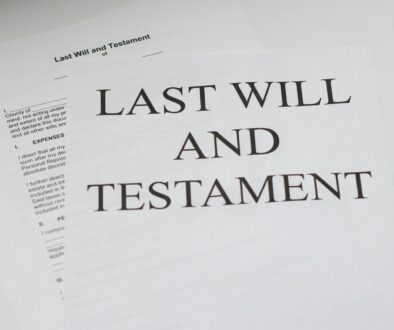Charitable Legacies
Once you have decided that you want to make a charitable legacy, the next decision is often which charity to benefit. Some people have charities that are close to their hearts because of lifetime events, someone they know has benefitted from the charity, a passion for certain animals or an interest in research in a certain area.
Not every organisation that a client wishes to benefit is a charity, for example some churches and religious institutions or sports and recreational clubs. Some charities that clients wish to benefit are not UK based. However, often there will be a wider charity that can be benefitted and with a UK registered charity number, the legacy can then be worded with an expression of a wish to benefit that particular organisation. The benefit of wording the legacy in this way is that your estate will benefit by not paying inheritance tax on that gift.
Charities need money for their charitable causes but also for the payment of staff, administrative functions, rent, utilities and other such outgoings. You can check the Register of Charities on the Charity Commission for England and Wales website, as to what a charity receives in donations and legacies and how it spends its funds on the different aspects of the operation of the charity. This may assist you if you are undecided as to which charities to benefit and to what extent, by seeing if the expenditure aligns with your wishes and values. Those decisions will affect how your legacy should be worded in your Will.
Those people whose estates will be inheritance taxable can benefit from a reduced rate of inheritance tax from 40% down to 36% if 10% of the estate is left to charity. The wording of this clause for your Will includes a formula and specific instructions as to wishes. Advice should be sought as to the correct wording for your wishes in this regard, along with wishes as to the extent other beneficiaries of the estate are to benefit.
Many people decide to leave a generous share of their Residuary estate to a charity or charities alongside family and friends. A specific clause is needed in your Will to avoid the charity share(s) being “Grossed up” for inheritance tax purposes. Without a specific clause the charity may actually receive more and your other beneficiaries less than you actually intended. Advice should be sought if you are looking to benefit charities from your Residuary Estate in this way.
It is important to have appropriate powers and provisions in your Will to enable the Treasurer or other appropriate officer from the charity to give a good receipt for the legacy. It’s also necessary to have appropriate powers in place to confirm what happens if the charity changes its name, amalgamates or no longer exists. If your Will incorporates the STEP (Society of Trust and Estate Practitioners) 2nd Edition provisions, you will have these powers and provisions incorporated. If your Will was made some time ago it may have older powers and provisions which may need to be reviewed to ensure that appropriate powers and provisions are included.
Finally, it is also worth considering leaving a Letter of Wishes with your Will explaining your reasons, wishes and intentions as to why you want that particular charity to benefit to the extent of that gift. Such a Letter of Wishes can be produced to a Court in the event of a claim being made against your estate and can assist your chosen charity in providing evidence of your intentions and wishes. Specific advice should be sought if you believe a claim may be brought against your estate.
Making a gift to a charity through your Will is a great way to fulfil your philanthropic values, particularly if during your lifetime you have not been able to give as much as you would have liked due to the ongoing expenses of daily life. You can still make a big difference to the lives of others and leave a lasting legacy.
Bowcock Cuerden LLP has an experienced team of Solicitors assisting in the preparation of Wills, Estate planning, Estate administration, Trusts, Lasting Powers of Attorney and Court of Protection matters, including members of the Society of Trust and Estate Practitioners (STEP), Solicitors for the Elderly (SFE) and the Agricultural Law Association (ALA).
For more information on the issues addressed in this article, please contact us on 01270 611106 or email reception@bowcockcuerden.co.uk
This article is not intended to be comprehensive or to provide specific legal advice. It should not be relied upon in the absence of specific advice given in relation to particular circumstances.




